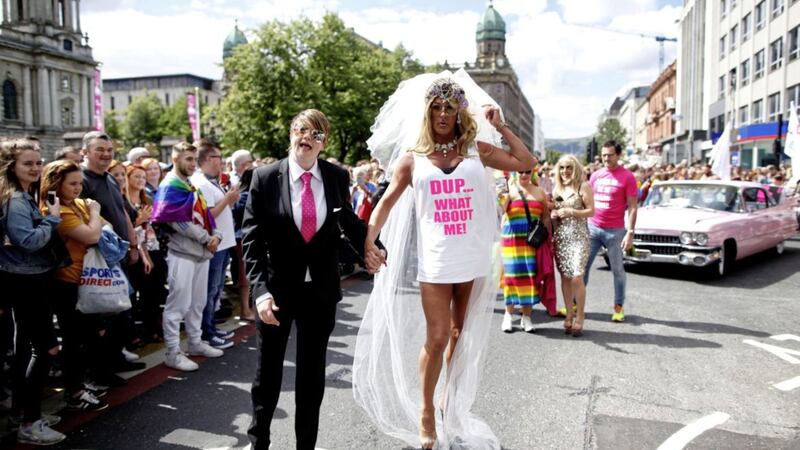IT is difficult to say if the north's executive, assembly and all-Ireland ministerial council will function again in the foreseeable future.
Comments from unionist politicians, most noticeably the DUP, over the last week would suggest that they have turned their back on the north's institutions in favour of a mixture of Tory patronage, ego-stroking and self-aggrandisement in return for supporting Theresa May's government.
The DUP are more comfortable in the bosom of the Tories than working the north's institutions, where it is confronted with demands for societal change which challenges its political-biblical view of the world and could pose risks to its electoral base should it agree with, for example, LGBT rights and marriage equality.
It rests easier on the DUP to shore up a government which governs a country where LGBT rights and marriage equality are legally guaranteed; where abortion is part of the society; where language acts underpin language diversity in Scotland, Wales, the Isle of Man and Cornwall and equality legally underpins a multi-cultural and diverse society.
It suits the DUP's interests not to agree to restore the institutions because of the unknown implications of liberalising northern society on the same basis as that of the south of Ireland or Britain.
There is clearly some new and fresh thinking taking place among a section of unionist opinion.
This first emerged publicly in June last year when the electorate of the north voted to remain in the EU.
This trend continued in the election in March when unionists lost their majority in the assembly - which was replaced with a progressive majority - and in the Westminster election in June when the unionist vote fell below 50 per cent - a first in both cases since partition almost one hundred years ago.
The DUP are more comfortable in the bosom of the Tories than working the north's institutions, where it is confronted with demands for societal change which challenges its political-biblical view of the world
It is difficult to quantify the size of the trend, if that is not too strong a word, and also the influences which are shaping it.
I think it is not an exaggeration to say that there has been a ferment of debate taking place among loyalists and on the progressive fringes of unionist society - political and religious - for quite some time, under the broad umbrella of what a future society moving out of conflict might look like.
These views are regularly reflected on a web site named after, and administered by the veteran journalist, Eamonn Mallie, and were also reflected at debates at this year's Féile an Phobal.
Three debates at Féile gave a flavour of the thinking and the discussions that are taking place inside a section of unionist and Protestant opinion: a conversation with Harold Good about his life and times; a debate about a short film, Traditions and Transitions, on marching flute bands; and a contribution from the PUP at an event titled 'The Left Speaks on Brexit'.
This was complemented by a recent and excellent article by the loyalist leader Winston Irvine on the Mallie website in which he thoughtfully and insightfully suggests how art as a medium is being used to "accommodate complex and competing narratives".
Irvine describes art forms as mediating a "power that sometimes discussion alone cannot achieve" that "the arts can act as an incubator for ideas, new connections, networking and relationships and stimulate new ways of thinking and talking about difficult issues".
The film Traditions and Transitions reminded me of the documentary made a few years ago by the Belfast actor Dan Gordon.
I believe both are must-see documentaries for those involved in reconciliation.
They introduce the viewer to a wholly different world and a surprising one if, as in my case, I understand marching bands via their sectarian behaviour outside Catholic churches or parading through communities where they are not welcome.
Traditions and Transitions is about the people in the bands - their love of music, musical instruments, the band as a social entity with its multi-sided positive influences on its members from a very young age.
This film presents an insight into a largely unknown yet very interesting and creative world.
Its weakness is it did not address the impact on nationalists and Catholics of the overt sectarian behaviour of some of the marching bands.
The executive and the assembly might be in cold-storage but there is no shortage of lively and positive debate out there.








